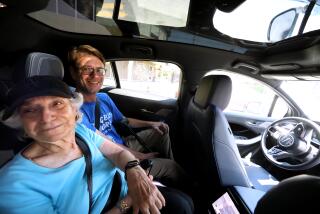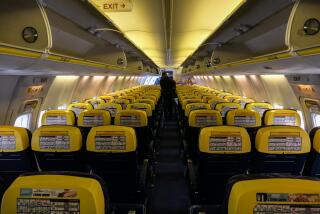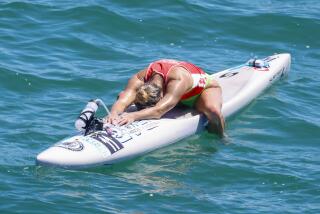Coming Full Cycle : Travel: As part of World Ride ‘95, David Cornelsen of Huntington Beach is riding around the world with a sense of mission and adventure.
- Share via
It’s not every day you wake up to a cow mooing in your hotel lobby. Or snuggle into your sleeping bag beside a herd of wild camels. Or drift off to sleep in a birch forest under the watchful eyes of three former agents of the KGB.
But when participating on World Ride ‘95, a 13,000-mile cycling expedition, you come to expect the unexpected. Just ask David Cornelsen of Huntington Beach.
Cornelsen, a 43-year-old social worker, is one of six core riders--four men and two women, all Americans--participating in World Ride ‘95, which began March 17 in Atlanta and--after circumnavigating the globe--is scheduled to finish Nov. 18 in Washington, D.C.
Participants, most of whom are physically disabled, ride an average of 55 miles per day, from dawn to dusk, for eight months. Along with the core riders, nearly 200 able-bodied and disabled athletes have taken part in various stages of the route, which winds through the United States, Ireland, England, France, Belgium, the Netherlands, Germany, the Czech Republic, Austria, Poland, Belarus, Russia, Kazakhstan, Mongolia, China and Japan.
The riders, who arrive via jetliner in Los Angeles on Thursday after 10 days in Japan, seek to promote the abilities of disabled people around the world. A bevy of international sponsors have put up a total of $4 million in expense money to see that that happens.
Cornelsen, a paraplegic who rides a three-wheeled, hand-powered cycle, says he was initially attracted to World Ride because “I thought it would be an amazing adventure.” As his diary shows, it has become that and more.
*
Day 171. Gobi Desert: Another exhausting day. Crossing the Gobi is the hardest cycling I’ve ever done. Several stage riders have gotten sick. All the men are looking haggard now with six days of growth on our faces, most of it gray . . .
Eight years ago, Cornelsen was a doctoral candidate in social work at the University of Pennsylvania. He had just accepted a teaching position at USC and, ever the athlete, was making plans to backpack the John Muir Trail through the eastern Sierra.
His girlfriend at the time invited him to a Fourth of July party in Baja California. Just outside Mexicali, the driver of the car they were in tried to overtake another vehicle but crashed into the median. Cornelsen, who was sitting in the back seat and wearing a safety belt, jackknifed, breaking his back. He didn’t receive medical attention for 19 hours.
His parents, who were vacationing in London, rushed to the San Diego hospital where Cornelsen had been airlifted. He hadn’t suffered a single scratch or bruise but was paralyzed from the waist down.
He completed his dissertation on a hospital gurney, flew to Pennsylvania, received his doctorate on schedule and made the phone call his parents will never forget: Mom, Dad? Hi. This is your son, Dr. Cornelsen, calling . . .
He kept pace athletically too, winning the wheelchair division at the 1991 San Francisco Marathon and setting records for speed (30.5 m.p.h.) and distance (236 miles in one day) in hand-powered cycling contests. He once cycled across the United States in a little more than 18 days.
World Ride ’95 seemed to be Cornelsen’s calling. The event, developed by the same people who helped 12 mentally disabled athletes ascend Africa’s highest peak five years ago in the Mt. Kilimanjaro Confidence Climb, promised to be grueling, perhaps even dangerous considering the political instability and remoteness of parts of the route. But the lure of adventure--and the prospect of a passport filled with stamps from exotic places--wasn’t something he wanted to let slip by.
“I like traveling, but in a wheelchair, there’s a lot more to consider,” Cornelsen said in a telephone interview last week from Omiyacho, Japan. “With this, [race organizers] planned the whole thing. All I had to do was get in and ride.”
*
Day 175. Jingjiang, China. Perhaps our most frustrating and discouraging day of World Ride for me. Slept in our tents to new depths of unconsciousness. Cycling back to our mud village, the breakfast we ate was as bad as the roads. I ate a half-dozen hard-boiled eggs and passed on the pickled stuff, whatever it was . . .
World Ride ’95 started smoothly enough. Honorary chairman Greg LeMond, three-time champion of the Tour de France, was in Atlanta to kick off the journey in March. Participants battled spring storms as they rolled north to Washington, D.C., then on to Boston, where they boarded a flight to Ireland.
In what would be the first of many meetings with dignitaries, riders were invited to dine with U.S. ambassador to Ireland Jean Kennedy Smith. The ride through Western Europe became almost cushy. Cornelsen gained several pounds thanks to the abundance of French pastries and fine cuisine.
But as World Ride rolled east, conditions became progressively harsher--and infinitely more interesting.
In Moscow, the group’s cycles were stored, for security reasons, in the bomb shelter of the Hotel Ukraine. A hotel custodian said he never expected in his lifetime to see a Russian bomb shelter used to protect American possessions.
Through Russia, Orthodox priests blessed the cyclists and their bikes and the vans that escorted them. Villagers appeared on roadsides to cheer the riders on. A 22-year-old man named Oleg showed up with a rusty bike and a sleeping bag to join the group. He’d just finished his duty with the army, and he wanted to join the World Ride cause.
The ride’s organizers hired Nikolai, Alexander and Sasha, former KGB agents, to provide armed security through Russia. The men proved to be a friendly bunch and, by the end of the Russian stage, were wearing Walkmans, courtesy of World Ride organizers.
In Siberia, the cyclists were met at district borders by local dignitaries wishing them well with a traditional bread-and-salt ceremony.
In Mongolia, villagers rushed from their huts to the roadside with fresh mare’s milk, anointing each cyclist’s bike as a blessing for the road. Every night, every morning, someone seemed to be offering a vodka toast.
*
World Ride turned to mud in China. Mudslides, mud puddles, mud in eyes and mouths, mud up noses. It was dreary riding. The pace was agonizingly slow. At one point, someone estimated that, at the rate they were going, the riders would not finish the day’s distance for 26 hours. Most of the time was spent scraping mud off fenders. When they finally reached a paved road, riders crawled off their bikes and kissed the asphalt.
But through all the drudgery, World Ride’s point was being made. The cyclists visited rehabilitation hospitals and institutes for the blind. They made appearances in town halls and on television, offering a message of hope.
They befriended disabled men and women, some of whom had lived their lives in second- or third-story apartments because the apartment had no wheelchair access.
“The standard term for disabled people in many parts of the world is ‘invalid,’ ” Cornelsen says. “In Russia, unless you come from a family of means, you have a dismal life as a disabled person. You might get a wheelchair if you’re lucky. But you’re totally dependent on others.”
One Russian man took Cornelsen to a half-built rehabilitation center that had run out of funds. The man, whose name is Lukin, told Cornelsen that he hoped to get enough money, about $50,000, to complete the project. But considering the economy in his homeland, he didn’t expect it to happen any time soon.
“I would love to help out someone like that,” Cornelsen says, “maybe as a joint venture with an American company. . . . Disabled people are really suffering internationally.”
For now, though, he and the other World Rider participants are happy just to continue their mission, spreading the word that disabled people are quite able when they try.
(BEGIN TEXT OF INFOBOX / INFOGRAPHIC)
Around the World in 8 Months
David Cornelson of Huntington Beach is in the core group of athletics with disabilities who are traveling the entire course of the World Ride ’95 cycling event.
Ride begins in Atlanta, March 17
Arrive Washington , D.C., March 27
Boston, April 8
Shannon, Irleand, April 9
Paris, April 26
Vienna, May 21
Moscow, June 15
Celjabinsk, Russian Federation, July 4
Novosibirsk, Russian Federation, july 23
Irkutsk, Russian Federation, Aug. 15
Ulan Bator, Mongolia, Aug. 27
Beijing, Sept. 15
Wajima, Japan, Sept. 16
*
Projected arrivals:
Tokyo, Today
Los Angeles, Thursday
Santa Fe, Oct 12
St. Louis, Oct. 30
Washington, D.C., Nov. 18
More to Read
Sign up for The Wild
We’ll help you find the best places to hike, bike and run, as well as the perfect silent spots for meditation and yoga.
You may occasionally receive promotional content from the Los Angeles Times.






